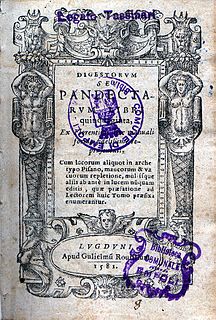
The Salic law, also called the Salian law, was the ancient Frankish civil law code compiled around AD 500 by the first Frankish King, Clovis. The written text is in Latin and contains some of the earliest known instances of Old Dutch. It remained the basis of Frankish law throughout the early Medieval period, and influenced future European legal systems. The best-known tenet of the old law is the principle of exclusion of women from inheritance of thrones, fiefs and other property. The Salic laws were arbitrated by a committee appointed and empowered by the King of the Franks. Dozens of manuscripts dating from the sixth to eighth centuries and three emendations as late as the ninth century have survived.
"An eye for an eye" is a commandment found in the Book of Exodus 21:23–27 expressing the principle of reciprocal justice measure for measure. In Roman civilization, the law of retaliation bears the same principle that a person who has injured another person is to be penalized to a similar degree by the injured party. In softer interpretations, it means the victim receives the [estimated] value of the injury in compensation. The intent behind the principle was to restrict compensation to the value of the loss.

Various lists regarding the political institutions of ancient Rome are presented. Each entry in a list is a link to a separate article. Categories included are: constitutions (5), laws (5), and legislatures (7); state offices (28) and office holders ; political factions and social ranks (8). A political glossary (35) of similar construction follows.

The European Cooperative Society is, in corporate law, a European cooperative type of company, established in 2006 and related to the Societas Europaea (SE). They may be established and may operate throughout the European Economic Area. The legal form was created to remove the need for cooperatives to establish a subsidiary in each member state of the European Union in which they operate, and to allow them to move their registered office and headquarters freely from one member state to another, keeping their legal identity and without having to register or wind up any legal persons. No matter where they are established, SCEs are governed by a single EEA-wide set of rules and principles which are supplemented by the laws on co-operatives in each member state, and other areas of law.

The Digest, also known as the Pandects, is a name given to a compendium or digest of juristic writings on Roman law compiled by order of the Byzantine emperor Justinian I in 530–533 AD. It is divided into 50 books.
Lex lata is a Latin expression used in matters of international law. Its most common translation is "the law as it exists," but it is sometimes seen as "the law that has been borne," or "ratified law."
The lex Hortensia, also sometimes referred to as the Hortensian law, was a law passed in Ancient Rome in 287 BC which made all resolutions passed by the Plebeian Council, known as plebiscita, binding on all citizens. It was passed by the dictator Quintus Hortensius in a compromise to bring the plebeians back from their secession to the Janiculum.

Salus populi suprema lex esto is a maxim or principle found in Cicero's De Legibus.
In conflict of laws, the term lex loci is a shorthand version of the choice of law rules that determine the lex causae.
Unwritten rules are behavioral constraints imposed in organizations or societies that are not typically voiced or written down. They usually exist in unspoken and unwritten format because they form a part of the logical argument or course of action implied by tacit assumptions. Examples involving unspoken rules include unwritten and unofficial organizational hierarchies, organizational culture, and acceptable behavioral norms governing interactions between organizational members.
The translation of "law" to other European languages faces several difficulties. In most European languages, as well as some others influenced by European languages, there are two different words that can be translated to English as "law". For the general comparison in this article the Latin terms "ius" and "lex" will be used. Etymologically, ius has some relation to right, just or straight.
Lex orandi, lex credendi, sometimes expanded as Lex orandi, lex credendi, lex vivendi, is a motto in Christian tradition, which means that prayer and belief are integral to each other and that liturgy is not distinct from theology. It refers to the relationship between worship and belief. As an ancient Christian principle it provided a measure for developing the ancient Christian creeds, the canon of scripture, and other doctrinal matters. It is based on the prayer texts of the Church, that is, the Church's liturgy. In the Early Church, there was liturgical tradition before there was a common creed, and before there was an officially sanctioned biblical canon. These liturgical traditions provided the theological framework for establishing the creeds and canon.
"Ratio scripta", or "written reason", was the assessment of Roman law commonly held in Europe during the Medieval period. It emerged during the revival of Roman law, serving as the basis of the ius commune. It was also used to evaluate the validity of leges propria or the local customs and positive legislation. Ratio scripta is also used to denote the popular opinion of Roman law held during the Medieval period. It could also mean the written opinion of a tribunal explaining its decision over a case.

The Lex Baiuvariorum was a collection of the tribal laws of the Bavarii of the sixth through eighth centuries. The first compilation was edited by Eberswind, first abbot of Niederaltaich, in 741 or 743. Duke Odilo, founder supplemented the code around 748. It is one of the most well documented bodies of Germanic tribal law.
Lex scripta pl. leges scriptae is a Latin expression that means "written or statutory law". It is in contrast to lex non scripta, customary or common law. The term originates from the Roman legal tradition. Emperor Justinian divides the lex scripta into several categories:

A-Lex is the eleventh studio album by the Brazilian metal band Sepultura. It was released on January 23, 2009 by independent German record label SPV. This is the first album featuring drummer Jean Dolabella, since the departure of Igor Cavalera in 2006.

Germanic law is a scholarly term used to described a series of commonalities between the various law codes of the early Germanic peoples. These were compared with statements in Tacitus and Caesar as well as with high and late medieval law codes from Germany and Scandinavia. Until the 1950s, these commonalities were held to be the result of a distinct Germanic legal culture. Scholarship since then has questioned this premise and argued that many "Germanic" features instead derive from provincial Roman law. Although most scholars no longer hold that Germanic law was a distinct legal system, some still argue for the retention of the term and for the potential that some aspects of the Leges in particular derive from a Germanic culture.
The legal history of the Catholic Church is the history of the oldest continuously functioning legal system in the West, much later than Roman law but predating the evolution of modern European civil law traditions. The history of Latin canon law can be divided into four periods: the jus antiquum, the jus novum, the jus novissimum and the Code of Canon Law. In relation to the Code, history can be divided into the jus vetus and the jus novum. Eastern canon law developed separately.
In orthography, a plene scriptum is a word containing an additional letter, usually one which is superfluous, not normally written in such words, nor needed for the proper comprehension of the word. Today, the term applies mostly to sacred scripture. Examples of plene scripta appear frequently in classical Hebrew texts, and copyists are obliged to copy them unchanged, to ensure that biblical or other sacred texts are written with universal conformity. The expression plene scriptum, sometimes simply described in Hebrew as מלא, is often used in contrast with defective scriptum, the latter implying a word in which a letter that is normally present has been omitted. Together, plene and defective scripta are sometimes described using the Hebrew phrase "yeter vehaser".







